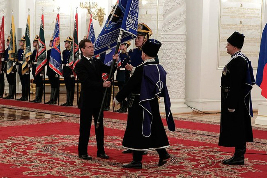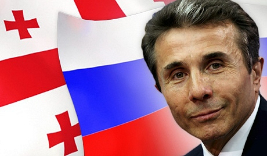Cossacks In North Caucasus Demand Increased Support from Moscow
by Valeriy Dzutsev (the 08/07/2013 issue of the CACI Analyst)
Terek Cossacks in the North Caucasus have laid out surprisingly bold claims to the authorities in Moscow, attempting to carve out large chunks of property and resources in the region. The Cossacks’ outburst clashes with the interests of North Caucasians and contribute to the rising tensions between ethnic Russians and ethnic North Caucasians. While Moscow and regional authorities in the ethnic Russian-majority provinces have repeatedly played the Cossack card against the North Caucasians, the government also apparently loathes giving the Cossacks excessive prominence, fearing they might eventually grow into an independent force and challenge the central government.

Shah Deniz Consortium Opts For Westward Gas Exports Through Trans-Adriatic Pipeline
by Mina Muradova (07/10/2013 issue of the CACI Analyst)
The Shah Deniz consortium has announced its selection of the Trans Adriatic Pipeline (TAP) as the route for transporting gas from the Caspian Sea to Europe. The choice of TAP over the rival pipeline Nabucco West determines a route that will be used to diversify gas supplies to the European market in order to reduce European dependence on Russian gas.
Normalized Georgia-Russia Relations May Contradict Georgia's Territorial Integrity
by Ariela Shapiro (07/10/2013 issue of the CACI Analyst)
On May 27, Russian border troops in South Ossetia started building barbed wire fences beyond the occupation line and into undisputed Georgian territory. These incursions, termed “borderization operations” by the Russian administration, are an estimated 25 kilometers in length and extend between 50-300 meters beyond the occupation line. While the U.S. State Department and European Union Monitoring Mission (EUMM) all promptly reacted by describing the fence building as “unacceptable” and “concerning,” neither were able to prevent or cease the construction. These actions demonstrate how Russia views the post-2008 “new geopolitical realities” and that Putin intends to dictate the terms and parameters of any “normalizing” of relations with Georgia.

CACI Analyst, June 26, 2013
Russia and Azerbaijan Terminate Baku-Novorossiysk Agreement
by Mina Muradova (06/26/2013 issue of the CACI Analyst)
Russia and Azerbaijan have recently terminated two strategic agreements. In May, the Russian government terminated a 1996 deal to transport oil from Azerbaijan through its pipeline system. The agreement on transporting Azerbaijani oil via the Baku-Novorossiysk pipeline envisaged the transit of at least five million metric tons of oil a year, with a tariff of about US$ 15.70 per metric ton.




